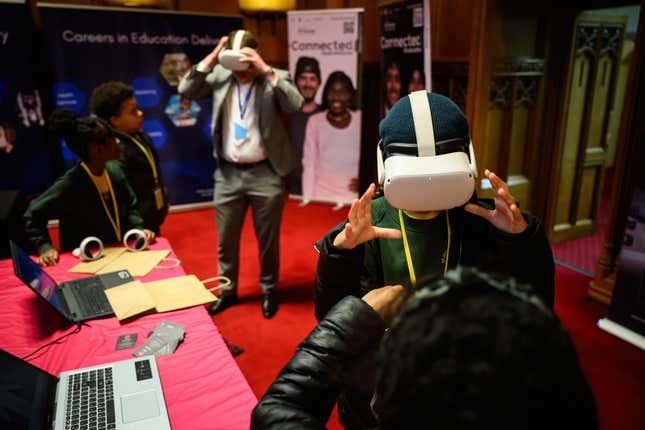
During the pandemic, the world learned the word for what you get when the lines between the real world and the internet blur: The metaverse. In theory, most people have wrapped their heads around the concept. But what do we do in and with this metaverse?
First mentioned in Neal Stephenson’s 1992 science fiction novel Snow Crash, the metaverse is essentially an online world where you can go to school, go to work, play games, watch concerts, go shopping, and much more without ever leaving your home. It’s the two-dimensional texts-and-images internet come to life à la the mirror worlds in The Matrix.
The first frontier—virtual reality headsets transporting people to different worlds visually—was achieved several years ago. Since then, the attempt has been to make the metaverse “livable” in all its glory, complete with all senses. A handful of startups are working on integrating scent; haptic gloves will allow wearers to touch and feel things; there’s a lickable TV prototype, and another tech that uses electrodes in cutlery to replicate sour, sweet, salty, or bitter sensations in the mouth.
But for the most part, the metaverse as it has been imaged and capitalized on hasn’t taken off. There are too many questions—what does policy and governance look like, how will children be protected, how much is a virtual shoe really worth, and so on—and not enough answers. Getting those answers will take time and money. Experts are split down the middle on whether or not a fully-immersive virtual world is even possible.
The metaverse isn’t cheap
While Meta initially dominated the metaverse talks, other big firms like Microsoft, chipmaker Nvidia, Amazon, and Disney quickly made their own big bets on its potential. Starbucks and Nike jumped on the bandwagon. One thing all these companies had in common in their metaverse hype? Money to burn.
But all those dollars haven’t paid off. Meta, the biggest company in the space, hasn’t cracked the economic balance yet. In fact, it’s far from it. The company that literally changed its name to show its commitment to the cause has seen costs, and therefore losses, widening. Since its inception in 2019, its Reality Labs division has lost more than $46.5 billion. Meta has warned investors to expect the situation to get worse before it gets better.
The brief (recent) history of reversing metaverse bets
January 2023: Microsoft shuts its virtual workspace AltSpaceVR.
February 2023: Microsoft ends its industrial metaverse project a mere four months in, and fires 100 people. It also slashes staff from its VR headset HoloLens’ team.
Also in February 2023: Chinese internet giant Tencent ditches plans to make VR hardware as a mature market for it appears to be many years off.
March 2023: Meta pivots toward generative AI in its “year of efficiency.”
Also in March 2023: Walmart shuts down a six-month-old branded space in the gaming world Roblox called Universe of Play.
March 2023, again: Disney eliminates its Metaverse team, comprising of 50 people.
June 2023: Google scraps its Project Iris for AR glasses, choosing to focus instead on AR software.
January 2024: Apple releases its VR Pro virtual reality / augmented reality headset, which sells for a cool $3,499 and is tentatively hailed as very cool and even helpful to humanity, but the idea of wearing it to travel into a virtual land to hang out with your pals doesn’t come up all that much.